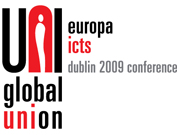News
Investment in high-speed networks will create jobs,boost ICT in Europe

As part of their plans to solve the financial crisis, European governments and companies should make more investment in high-speed internet networks to create new jobs and spur innovation in the industry, UNI Europa, the trade union organisation representing 7 million workers in the services and communications sectors, said today.
UNI Europa believes the European Union’s telecom package offers a chance to invest in new technology, like broadband internet, as a way to combat the current recession and the loss of hundreds of thousands of jobs throughout the EU.
“We see ourselves as full-fledged partners in planning the future of the technology and communications industry,” said Bernadette Ségol, UNI Europa regional secretary. “Investment in infrastructure is a public good and the job creation that will come along with that is vital to rebuilding local economies and ending the global recession.”
A 2008 report released by the European Commission on the impact of broadband on growth and productivity said that broadband development would contribute to the creation of more than a million jobs in Europe and over €849 billion in economic growth in 9 years.
“We need investment in high-speed internet to stimulate the ICT industry and to create new jobs. Universal fast broadband is a core element of the modern infrastructure that the EU will need to compete internationally,” said former Member of the European Parliament Erika Mann, who will speak at the UNI Europa conference on Information and Communication Technology today.
UNI is holding the UNI Europa Information Communication Technology and Services conference in Dublin, where unions from across Europe, representatives of the EU institutions and employers discuss the future of the industry. UNI Europa represents more than one million workers in the ICT sector throughout Europe and it believes trade unions can play a vital role in developing the industry.
Any European regulation, including the telecom package, has to respect the concerns of the industry’s workforce,” Mann said. “Workers and consumers alike should benefit from regulation that paves the way for innovation and job growth in the ICT sector.”
Encouraging investment and breaking down the barriers to next generation broadband rollout requires regulatory predictability and stability. UNI Europa urges the European Parliament and the Council to solve the remaining obstacles and finalise the EU telecom package as soon as possible.
UNI Europa Information Communication Technology and Services is the European trade union organisation for workers in the ICT sector. UNI Europa ICTS is part of UNI Europa, a European trade union federation for services and communication, representing 7 million workers in 330 European trade unions.

